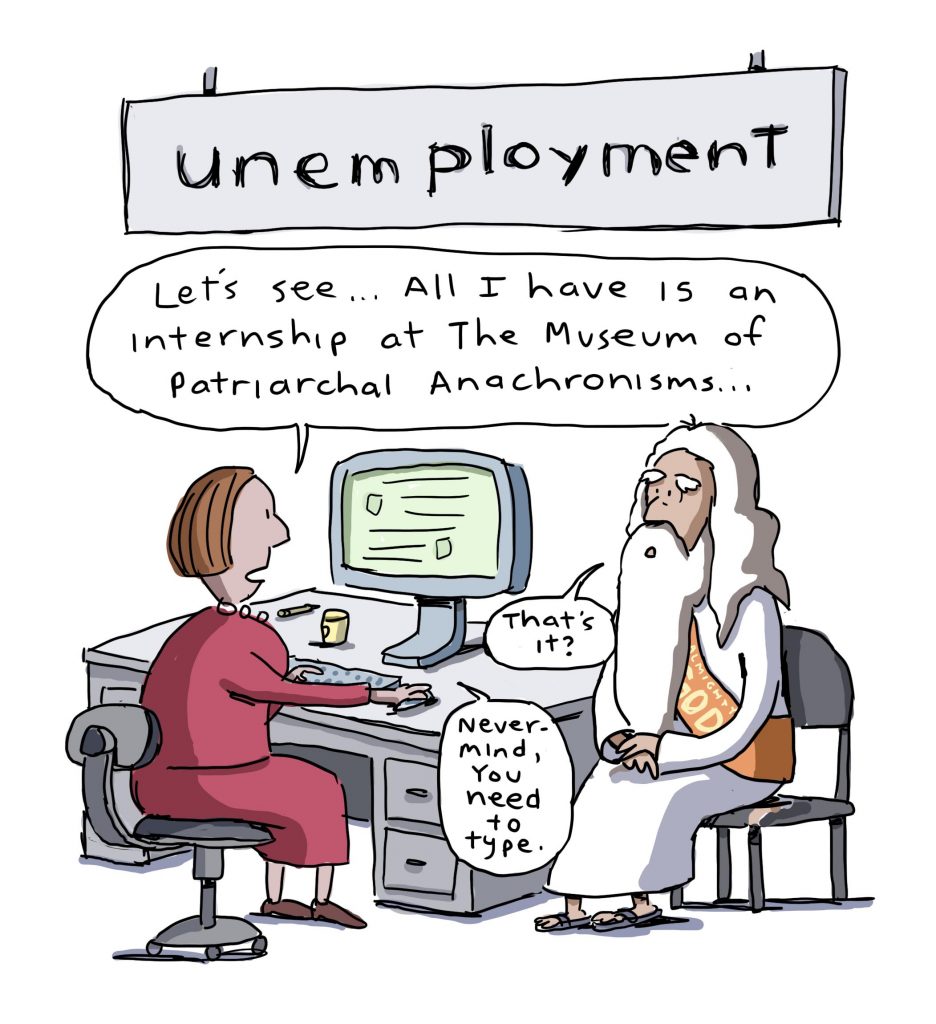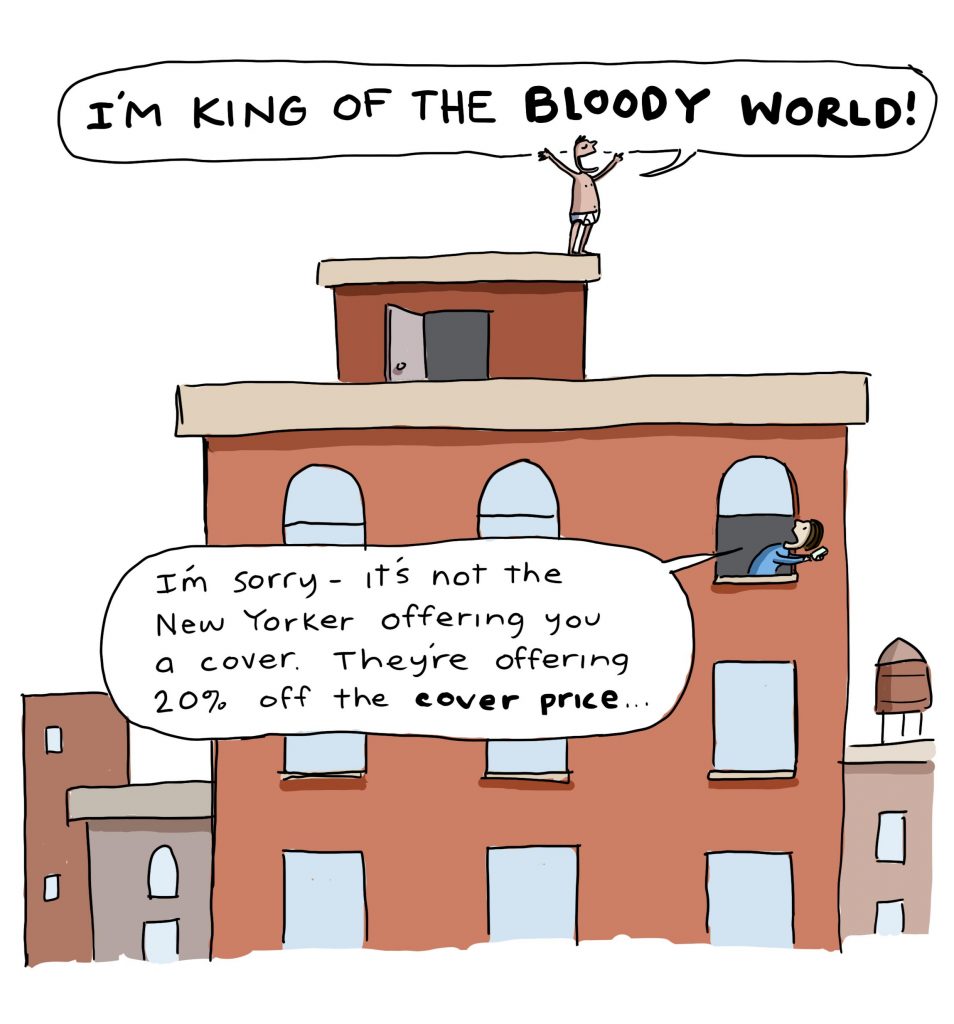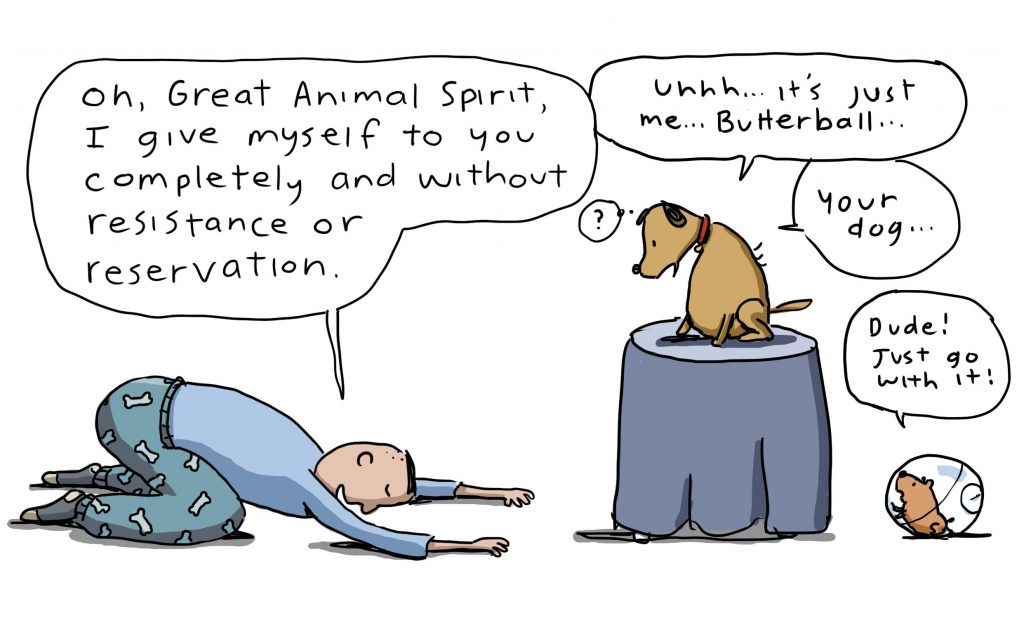
I’m not an evangelical denier on the issue, but I see no evidence to support the idea of a god that is busily choreographing everyone’s lives. Unless of course, that god happens to a horrible choreographer. I have a much easier time believing in a god who set everything in motion and then took a long nap. But that’s a hands-off god who needs an alarm clock more than our prayers. Between my lack of a personal religious history and the overbearing, confused antics of “true believers,” I don’t expect I’ll be hooking up with an off-the-rack god anytime soon.

Yet, living under the loving guidance of a higher power has a definite appeal. I notice that things go best for me when I surrender control, instead of wresting it. And, when I live as if a higher power is orchestrating outcomes to help me learn what I need to know.
So, I made up a god that doesn’t exist. Sorry, “existing” Gods.

They say when you pray for patience, god puts you on the end of a very long line. I love this formulation of god, but as long as I’m doing all the work, why do I even need a capital-G god at all? I’m already on lots of long lines, presumably without any supreme intervention. Why not cut out the ordained middleman altogether?
The second I ask myself what I can learn from every situation I find myself in, my imaginary god quickly becomes fully active in my life. When I’ve met with failure, as I have many times, my make-believe god has turned my disappointment into critical lessons in humility. I realize that this could easily sound like a convenient load of self-delusion from a chronic loser. Nevertheless I’ve always suspected that I’d be an ideal candidate to misinterpret great success in an emotionally damaging and socially insufferable way. So, whether or not god had anything to do with it, I am considering myself luckily un-famous. At the least, that’s a pretty slick trick of self-acceptance.
And, it’s made me mercifully more humble.

By turning life into an education, my imaginary god reliably reframes things so I am exactly where I’m supposed to be, no matter where I am. That takes a lot of pressure off me, which is exactly what I want a deity to do.
The most important lesson my fictitious god wants me to learn is about acceptance. Suffering always starts when we get what we get, but we still get upset. And then stay upset.

My god says it’s pretty obvious that the more I can roll with the way things unfold, the happier I’m gonna be. My god says acceptance isn’t about giving up. It’s doing my best and not fighting the outcomes over which I have no control. Acceptance is about adjusting my expectations to match the way the world actually works instead of my toddler notions of how I want it to.
My make-believe burning bush tells me four key things about acceptance:
1. I’m not in charge. Yes, I have agency, but that doesn’t make me almighty, or even mighty. The world is much bigger and more powerful than I’ll ever be.
2. My perception in the moment, however horrible, is certain to change. My pretend god tries to remind me that things will not always seem so bad. I will adjust even when I don’t want to or think it is possible.

3. Things work out best for those that make the best of the way things work out. This is one of my imaginary god’s all-time favorite, immutable, award-winning, common-sense commandments.
4. It is presumptuous to think I know what’s best for me. When things don’t go my way, it’s super helpful to consider that some of my darkest days routinely prove to be critical turns for the better. Sickness, getting fired, and being handcuffed have led to gratitude, better jobs, and blessed sobriety. You can never tell where anything’s gonna lead.

My god likes to note that losing my mother suddenly when I was only 21 may have brought some lessons, but it’s never been remotely worth it. It’s always been awful and only gets worse as I lose more and more years with her. But that’s the beauty of a wholly concocted god. It can not fail me because it doesn’t exist. Stuff happens. Nothing’s 100%.
You may be wondering how a person can believe in a god that they don’t believe in. It’s a very good question. Personally, I didn’t start out trying to bamboozle myself. I just naturally sought common-sense wisdom by which to live. It turns out there is a lot of overlap between that wisdom and what a god might say, if one existed. Eventually, it organically morphed into a sense of a higher power directing me without any real effort on my part to believe anything. And no tithing.
I tried some prayer and meditation here, and a brief moment of absolute surrender there. I liked it. Letting go simply feels good.

There is an art to accepting what we can not change and changing what we can. Dropping the whip and listening to the horse is an act of faith and devotion that conjures the spiritual for me. Maybe it’s nothing more than relinquishing my ambitions and assumptions long enough to listen to my deeper intuition, but that feels like something much more powerful and sane than I am.
It makes absolutely no sense that children are starving and people are being tortured while God is busy teaching me how to find meaning in not getting a book deal. It’s downright preposterous. And, no, I’m not going to take it on faith that God has his reasons for the horrors of the world. I just don’t see how to believe in a seriously deranged, dumb-ass higher power like that.
But a god that actually doesn’t exist? Now, that seems to be something I can really get behind.